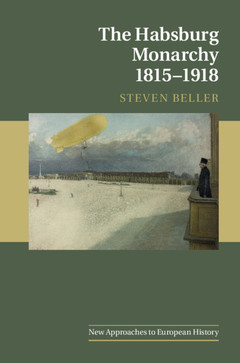Description
The Habsburg Monarchy 1815–1918
New Approaches to European History Series
Author: Beller Steven
This clear and compelling account explains why, a century after its disappearance, the Habsburg Monarchy has never been more relevant.
Language: English
Subject for The Habsburg Monarchy 1815–1918:
Approximative price 104.06 €
In Print (Delivery period: 14 days).
Add to cart
The Habsburg Monarchy 1815-1918
Publication date: 05-2018
326 p. · 15.6x23.5 cm · Hardback
Publication date: 05-2018
326 p. · 15.6x23.5 cm · Hardback
Approximative price 31.58 €
In Print (Delivery period: 14 days).
Add to cart
The Habsburg Monarchy 1815-1918
Publication date: 05-2018
326 p. · 15.2x22.8 cm · Paperback
Publication date: 05-2018
326 p. · 15.2x22.8 cm · Paperback
Description
/li>Contents
/li>Biography
/li>
This clear and compelling account of the Habsburg Monarchy in its last century explains why, a century after its disappearance, it has never been more relevant. With extensive discussion of recent historiographic controversies about the Monarchy's character and viability, Steven Beller presents a detailed account of the main strands of the Monarchy's political history and how its economic, social and cultural development interacted with this main narrative. While recognizing the importance of these larger trends, readers will learn how the historical accident of personality and the complexities of high politics and diplomacy still had a central impact on the Monarchy's fate. Although some would see the Monarchy as an atavistic irrelevance in the modern age, its multicultural, multinational experience and inclusive 'logic' was in many ways more relevant to our modernity than the nationalism that did so much to bring about its demise.
List of figures; Introduction: Austria and modernity; 1. 1815–1835: restoration and procrastination; 2. 1835–1851: revolution and reaction; 3. 1852–1867: transformation; 4. 1867–1879: liberalization; 5. 1879–1897: nationalization; 6. 1897–1914: modernization; 7. 1914–1918: self-destruction; Conclusion: Central Europe and the paths not taken; Bibliography; Index.
Steven Beller is an independent scholar, having studied history at the University of Cambridge, and been a Research Fellow at Peterhouse, Cambridge. He has been a Member of the Institute for Advanced Study in Princeton, and a Fellow of the Institute for the Human Sciences (IWM), as well as of the International Research Centre for Cultural Studies (IFK). He has written extensively on subjects in modern Central European and modern Jewish history and was awarded the Austrian State History Prize for the German translation of his first book Vienna and the Jews, 1867–1938: A Cultural History (Cambridge, 1989) in 1995. Other books include Herzl (1991); Francis Joseph (1996); A Concise History of Austria (Cambridge, 2006); Antisemitism: A Very Short Introduction (2015); and Democracy (2013). He is a member of the European Academy of Sciences and Arts and has taught modern European and modern Jewish history.
© 2024 LAVOISIER S.A.S.
These books may interest you

The Habsburg Monarchy, 1618–1815 96.55 €

The Habsburg Monarchy, 1618–1815 36.76 €


